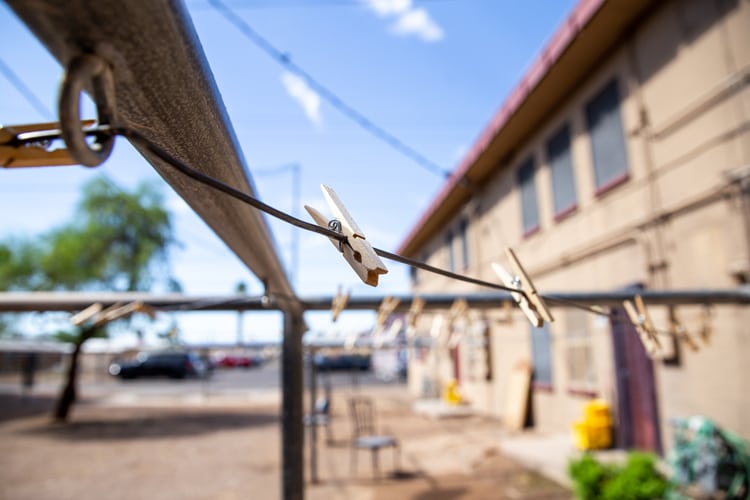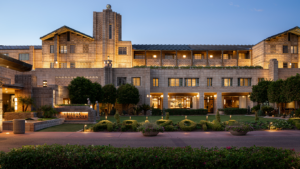As new apartment buildings crowd the downtown skyline and rents rise across Phoenix, low-income residents continue to rely on decades-old public housing. But that’s beginning to change: In June, the city announced that the A.L. Krohn East apartments in central Phoenix will be completely replaced with new units.
Access to affordable housing is a chronic problem for low-income residents, including Imelda Hartley, who has lived at A.L. Krohn East for close to two years.
“Before I was able to move here, I was living for years in a one-bedroom apartment with eight children,” said Hartley, who’s the CEO of Happy Tamales, a catering service. “So, for me to be able to live in affordable housing, a five bedroom for me is just … I’m in heaven.”
A.L. Krohn East, tucked among historic single-family homes and new construction near Eastlake Park at Jefferson and 16th streets, is an inconspicuous mix of mustard-color walls, red roofs and scruffy patches of Bermuda grass between sidewalks. The apartments were built in the early 1960s; the last improvement was a decade ago, when air-conditioning replaced the swamp coolers common in other public-housing complexes.
In June, Phoenix announced that it received Low-Income Housing Tax Credits from the Arizona Department of Housing to redevelop the property. The tax credit will help Phoenix attract an investor to finance the construction, said Angela Duncan, the deputy director of the city’s Housing Department.
“We’re going to be looking at bringing in an investor or a tax credit syndicator who will invest in the development of this affordable-housing project,” she said. “They provide the equity to build the project in exchange for tax credits over a 10-year period.”
The city has tentatively scheduled demolition to begin in May 2019, with new apartments completed the end of 2020.
“We’re excited to be able to do this, to provide a brand-new community for existing residents as well as add additional units,” Duncan said. “It’ll just improve the conditions for the neighborhood, improve the conditions for our residents by rebuilding this housing.”
The construction will replace the current 38 units with 78 updated units, with added amenities, such as playgrounds and community meeting space. According to a 2017 report from the National Housing Preservation Database, there are 49,416 publicly supported rental homes in Arizona, with 168,367 additional rental homes needed for low-income residents.
“It’s not just going to be the apartments,” Hartley said, “what they’re going to look like and they’re going to be brand new, but also the other amenities, you know, they’re going to have more community rooms, embedded playgrounds and all of that. I’m truly excited.”
Residents will have to move out of Krohn East during demolition and constructions, but Duncan says the city is helping residents look for alternative public housing, and current residents will be first in line to move back in.
“We’re including residents at every step, not just on the relocation which directly affects them, but also design and amenities,” Duncan said. “We want to hear from residents: What do they want to see in their communities?”
Some of the improvements that Hartley wants to see are as simple as a garbage disposer in the kitchen sink or a dryer. She said her neighbors, who she has encouraged to be involved in the redevelopment process, also are looking forward to living in the new units.
“I was very excited to be part of this. It wasn’t just someone doing something for me, but hey, what are the things that you would like to be put in?” Hartley said. “I think that was very important, and we felt that we were valued.”
The next community meeting for residents, where they will learn more about the scheduled redevelopment and their options for relocation during the construction, is scheduled for July 31.
The redevelopment also is taking place under the Rental Assistance Demonstration program, which shifts units from the traditional public-housing program, in which properties are owned and managed directly by the city, to the Section 8 housing program, a voucher program in which residents pay subsidized rent to a private landlord.
The complex is named for Rabbi Abraham Lincoln Krohn, who was involved with Phoenix Elementary School Board, the Phoenix Public Library and the Arizona Mental Health Association. He died in 1958.




